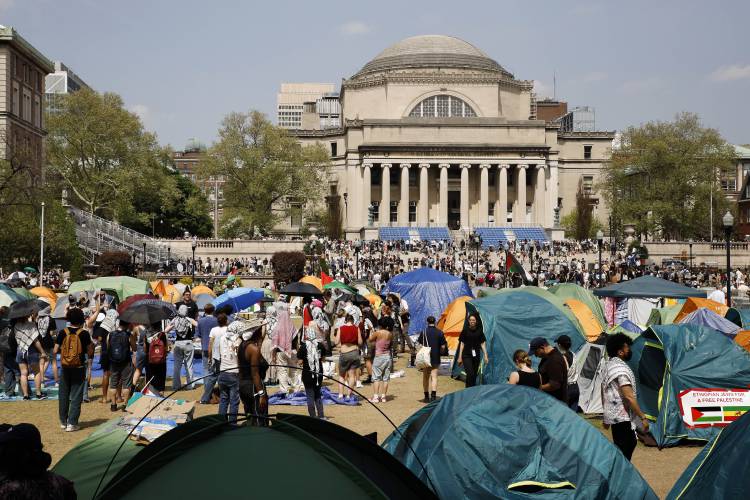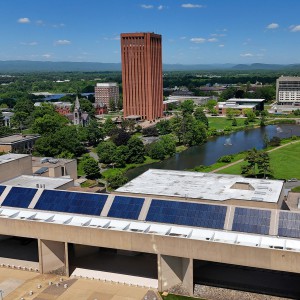Guest columnist Teresa Amabile: Undermine education, undermine our future

Student protesters gather inside their encampment on the Columbia University campus, April 29, 2024, in New York. AP FILE PHOTO/STEFAN JEREMIAH
| Published: 04-03-2025 11:48 AM |
My grandparents, all Italian immigrants in the early 20th century, never progressed beyond a few grades of elementary school; one of my grandmothers was illiterate. My mother’s father was a barber and my father’s father was a day laborer, digging ditches and shoveling snow in Buffalo. Neither of my parents, growing up in the Great Depression, could realize their dreams of a college education. Instead, they went to work after high school graduation to help their families survive.
Yet each of my six siblings and I attained college degrees, and most of us earned graduate degrees as well. Last year, I retired after a long, satisfying career as a Harvard professor. Our family could not be more grateful for the education we received at both private and public institutions.
For generations, education in the U.S. was a source of national pride, an engine of societal improvement, a family’s means to upward mobility, and the envy of the world. Now, in a mere matter of weeks, the new administration in Washington is undermining education at all levels.
If you attended an American public school in the past 40 years, or have a child attending public school now, you may not recognize your local school in a year or two. Why? On March 20, the president signed an order aimed at dismantling the Department of Education, a cabinet-level agency established by a law passed by Congress in 1979 that serves all levels of education in America. By doing so, the president abandoned his constitutional duty to “take care that the laws are faithfully executed.”
Many of us don’t know the specifics of what the Department of Education actually does. A lot, as it turns out, even with the smallest staff (about 4,200 employees) of all the cabinet agencies. In recent years, it has provided 13.6% of funding for public K-12 education, including grants for students with disabilities (under a federal law that guarantees students with disabilities access to a “free and appropriate” public education) and funds for low-income communities.
Yes, most funding for public K-12 schools does flow from the local and state levels. But those taps aren’t flowing freely in western Massachusetts right now, as evidenced by the recent Gazette news article, ”Strapped for school funding, Valley schools eye lagging state aid” [gazettenet.com, March 21].
And there’s more. The Department of Education is charged with protecting students from discrimination and ensuring equal access to education under nondiscrimination and civil rights laws in federally funded schools. It tracks student achievement, advises local schools on policy and problem-solving, administers several college student aid programs including Pell grants and work-study, distributes and monitors federal financial aid for education funds, and manages our nation’s massive $1.7 trillion in outstanding federal student loans.
Article continues after...
Yesterday's Most Read Articles
 Local ‘Hands Off!’ standouts planned as part of national effort
Local ‘Hands Off!’ standouts planned as part of national effort
 Long-vacant former Faces spot in Northampton gets new tenant
Long-vacant former Faces spot in Northampton gets new tenant
 Here come the sweetness: Four new businesses prepping to open in downtown Northampton
Here come the sweetness: Four new businesses prepping to open in downtown Northampton
 State senators organize Trump defense: Comerford a leader on Response 2025 initiative
State senators organize Trump defense: Comerford a leader on Response 2025 initiative
 Five UMass Amherst students have visas, student status revoked
Five UMass Amherst students have visas, student status revoked
 Hatfield Select Board removes elected Housing Authority member
Hatfield Select Board removes elected Housing Authority member
As bad as the dismantling of the Department of Education will be, the assault on higher education has gone well beyond the pending removal of support previously offered by that department. The onslaught of negative rhetoric from the administration about colleges and universities has been especially fierce, the executive orders undercutting them have been outrageous, and the early outcomes have been sickening.
Within recent weeks, we have seen the administration yank $400 million in federal grants and contracts from Columbia University and the president demand that, in order to have that funding restored, Columbia must make changes in its protest policies, security arrangements, and even one of its academic departments. The university knuckled under, receiving no guarantee that the federal funding would be restored — and the threat to academic freedom grows.
Decades-long advances in diversifying student bodies and faculties in higher education are beginning to unravel. On March 19, the administration said it would suspend $175 million in federal funding from the University of Pennsylvania because the university had allowed a transgender woman to compete on the women’s swim team. The same day, the University of California, the largest state university system in the country, said it would stop requiring the use of diversity statements in hiring. It appears university leaders decided to “obey in advance” any formal demands from the administration to dismantle DEI.
An especially harmful aspect of the assault on higher education — harmful for the entire nation — is the threatened removal or dramatic reduction in federal research grant funding. Federal research grants to universities fund most of our nation’s advances in preventing, diagnosing and treating cancer, heart problems and infectious diseases. Not to mention funding of other sciences and technologies.
The assault began less than two weeks into the president’s term, when the Office of Management and Budget issued a memo that threatened to freeze all federal research grants. Although, under judicial pressure, that memo was later rescinded, the threat felt by academic researchers and their universities remains real.
We must resist the destruction of education in America as forcefully as possible, before it’s too late and we forfeit our future. Please join me in voicing alarm and demanding action from our legislators at the local, state and national levels. And, if you are an educator or educational administrator, do not capitulate to the destructive pressures now facing you. Resist, knowing that thousands of us stand with you.
Teresa Amabile of Amherst is Edsel Bryant Ford Professor of Business Administration, emerita, at Harvard Business School.






 Guest columnist Dr. Shelley Berkowitz: Single-payer health care just needs vote
Guest columnist Dr. Shelley Berkowitz: Single-payer health care just needs vote Guest columnist John Saveson: Use your spending power for the planet
Guest columnist John Saveson: Use your spending power for the planet Betty Ussach-Schwartz: The greatest grift of all
Betty Ussach-Schwartz: The greatest grift of all Jerry Halberstadt: Problems at Northampton Housing Authority seen in many housing programs
Jerry Halberstadt: Problems at Northampton Housing Authority seen in many housing programs
